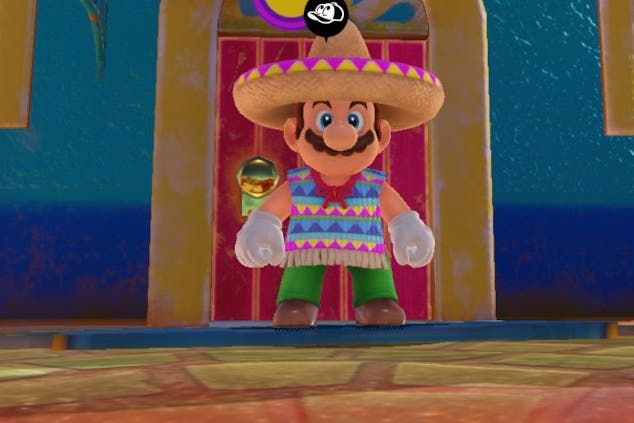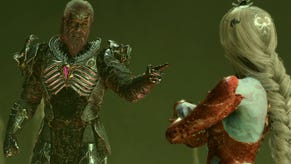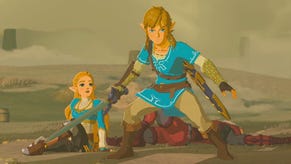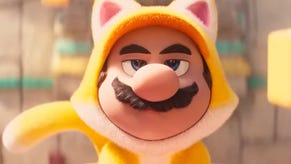Mario Odyssey encourages curiosity - and what higher praise is there?
Well, there it is.
Halfway through every Mario game I have the same revelation, and it always comes as a shock, as a total surprise. Halfway through every Mario game I suddenly realise that it's not about where Mario takes you from one adventure to the next, it's about what he encourages you to become along the way. Mario games aren't just great because they're imaginative and generous and precision-made. They're great because, in being all these things, they prod you towards becoming an ideal kind of player - a player who's inventive when it comes to problem-solving, who's able to wield a complex move-set with real accuracy, and who's sufficiently engaged in what's going on right now to hunt down every available secret in a world that's thrillingly dense with them. Mario forces you back into the moment. He encourages you to be playful. For me, every Mario game is like taking a holiday. It's like taking a holiday from the kind of game player that I usually am.
And Odyssey, which I am playing at the moment in antic bursts, reminds me that Mario games are always finding new ways to bring out the best in you. This time I think it comes down to a brilliant recalibration rather than a sweeping sense of reinvention. Firstly, the moons you collect in Odyssey are a little less of an event than the stars were in Mario 64 or the shines were in Sunshine. Equally, there are a lot more of them. This means that, in the course of half an hour, you can hopefully collect four or five moons if the wind is at your back.
On top of this, the worlds you visit feel like they're smaller than they were in Mario 64. This may be memory playing tricks on me, of course, but I would argue that Odyssey's very best worlds are definitely also the snuggest. This means that all those lovely moons are always so much closer to hand. Voila: when finding a moon doesn't kick you back to the start, and when there are likely to be a gaggle of them around you at any time, Odyssey encourages extremely good player behaviour. The best kind of behaviour: curiosity.
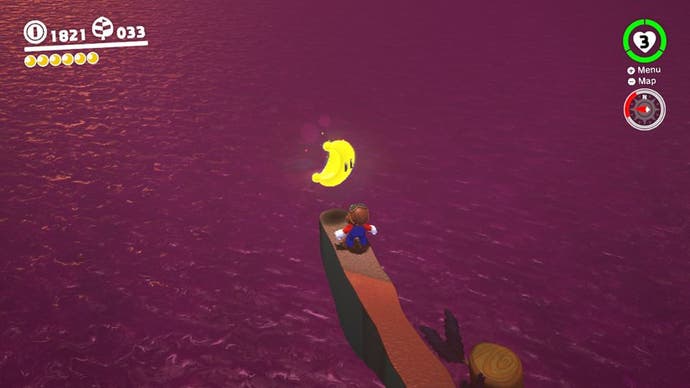
It would never have occurred to me that Odyssey's particular genius might be a question of scale had I not crashlanded, a few worlds deep, in the Forgotten Isle. Oh man, the Forgotten Isle. Reader, I will never forget the Forgotten Isle. This is hands down my favourite world in Odyssey so far. This island feels tiny and crammed with stuff. The gap between learning how to do something - or being reminded, subtly, that you can do it - and putting it into action in an unexpected manner is always very small, and everything you're working towards seems like it will be achievable very quickly.
You can always see a couple of things you might like to try, and it's all so delightfully laid out. I can't entirely grasp the organising conceit to Forgotten Isle - something to do with primeval landscapes, but also, perhaps, with Amelia Earhart? - but I have a tangible sense of the place regardless. I know that the air would have a mineral thickness here, and that the ground would tremble slightly underfoot, as if magma was coursing somewhere beneath me. I know that the rubbery plants that cover the hard, chocolate-tart earth would be glossy but not wet if I pushed through them, and that the radioactive sunset that fills the horizon in every direction would be painful to stare at for too long. Not a bad return for an environment which is essentially an over-sized Toffifee.
All of this stuff is taken in at length. I have spent hours here already. Paradoxically, because the fun is so easy to get to, always nearby or at most a quick fast-travel hop away, I find I've become surprisingly patient and thorough when it comes to getting the most of everything. I spent the best part of thirty minutes just messing around with the roving Wigglers who, once possessed, can be made to concertina across gaps with a lovely, snaking, squeezebox movement, winding around poles and fitting through secret hidey-holes like a strange key going into a strange lock. I spent an absolute age learning how to dodge the little bug-like guys, too, the ones who steal your cap, launch it back at you and then explode. Frankly, I had a happy few minutes just bouncing up and down on the staircases that you can pound into and out of the earth. For every action, a reaction. There are some laws that not even Mario will tamper with.
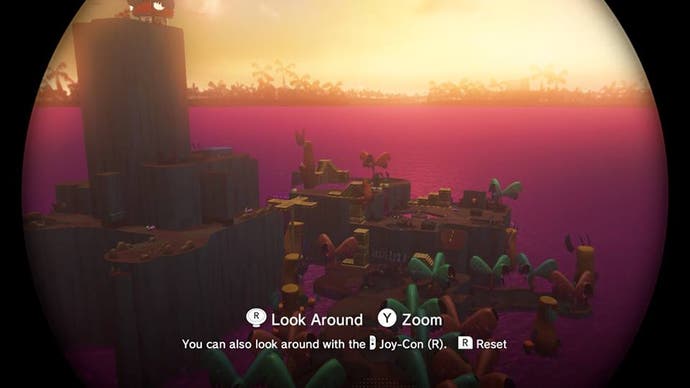
All of this before I got to the moons themselves, which constantly required applying the tricks I'd been learning in unexpected ways. If a staircase can erupt from the earth, could something be hidden inside it? If those cap-pinching bugs are so eager to explode, could I turn that to my advantage? If I'm climbing a mountain, might there be something going on underneath it? If the lakes here offer endless vistas of toxic goop, what kind of islands could be waiting out there for me to discover, and how could I reach them? There's almost no punishment for trying something that doesn't work in this game, and there's every indication that you're meant to experiment with things in ways that initially seem counter-intuitive. In other words, it's hard to spend too much time on the Forgotten Isle without becoming the kind of person who looks at the landscape around them and sees wonderful possibilities lurking everywhere.
Curiosity, the most playful of qualities, is ultimately tied to empathy, or so it seems to me. Curiosity certainly seems to lead to empathy, or the pursuit of empathy at any rate. Slowing down in the Forgotten Isle, I'm struck yet again by the way that the games I really love encourage a new way of thinking. They are a dialogue between you and the game. A dialogue in which you learn to think the way that the developer thinks. And, really, what could be better than that?
